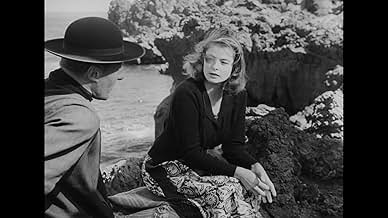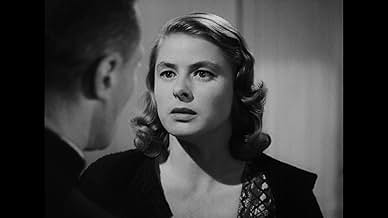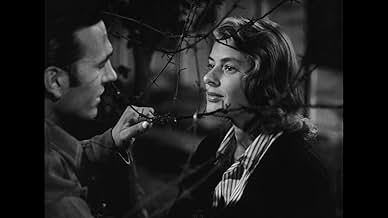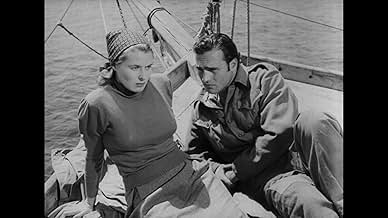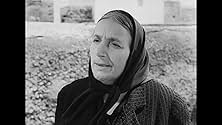AVALIAÇÃO DA IMDb
7,2/10
8,5 mil
SUA AVALIAÇÃO
Karin, uma jovem mulher báltica, casa-se com o pescador Antonio para escapar de um campo de prisioneiros. Mas não se pode habituar à vida dura da aldeia de Antonio, ameaçada pelo vulcão Stro... Ler tudoKarin, uma jovem mulher báltica, casa-se com o pescador Antonio para escapar de um campo de prisioneiros. Mas não se pode habituar à vida dura da aldeia de Antonio, ameaçada pelo vulcão Stromboli.Karin, uma jovem mulher báltica, casa-se com o pescador Antonio para escapar de um campo de prisioneiros. Mas não se pode habituar à vida dura da aldeia de Antonio, ameaçada pelo vulcão Stromboli.
- Direção
- Roteiristas
- Artistas
- Prêmios
- 2 vitórias e 1 indicação no total
Gaetano Famularo
- Man with Guitar
- (não creditado)
Angelo Molino
- Child
- (não creditado)
Roberto Onorati
- Man
- (não creditado)
Avaliações em destaque
Stromboli is a film with the look of Flaherty's `Man of Aran' and the dramatics of von Trier's `Breaking the Waves'. The story is the tragedy of a woman named Karin, a Lithuanian refugee after WWII and her pursuit of a better life marrying an Italian peasant and moving down with him to his birthplace, a volcanic island off the coast of southern Italy.
Rossellini portraits her heroin without sentimentalism or affection of any kind. He seems to be more interested in revealing her dark sides and miseries, but as Bergman's performance is so emotionally raw, we cannot but stick with her to the end of her journey. We do not pity her, but take pity with her. Rossellini's strong Catholicism usually forces us to live through his films as Catholics, regardless of which belief one may have.
If war was hell then the post war can be redemption time. Karin has nostalgia of her past, a lost-paradise, and all her efforts are put to restore that primal state. She's an Eva cast away from Eden, with somehow Bovarian ambitions, trying to reach prosperity at any cost. Her chances are scarce, so she takes the only opportunity she gets to leave the camp, marrying Antonio, a peasant whom she first kisses through barbed wire. She will soon realize that Antonio's island is miles away of the paradise of her dreams. The place is barren and the locals are hostile. She's trapped in a labyrinth surrounded by sea and menaced by an active volcano. Any form of relationship, even with her husband, is impeded because of a communication problem. Technically she cannot speak the language. But she cannot either penetrate a hermetic, oppressive world ruled by rites and tradition. If paradise was a state where men could speak the language of the gods in harmony with nature, Karin's pilgrimage will ultimately have to restore that dialogue, rebuild that bridge with origin.
In her symbolic descent to primitivism she learns the meaning of life in the hard way, and at the same time she follows all the phases of mankind from the first cry of the new born, to subsequent life in a cavern, cave-painting, elemental worshipping, fishing for subsistence and conversion. Karin's fault is her self-sufficiency, denying the existence of a superior order and her mundane ambition of a destiny ruled by luxury and comfort. She thinks the place is filthy and defines her belonging to `a different class'. When she realizes that there's no place for glamour in Stromboli she turns into an Eve and tempts the local priest. This behaving sooner or later will provoke the wrath of the gods, portrayed in the everlasting volcano to which the fate of the islanders is attached from immemorial days. To outcome her tragic fall, Karin should ascend the top of the mountain while getting rid of her material belongings (the money, the suitcase), rise up her head to the sky and address God. Rossellini doesn't show us if she saves her life or not because the thing is that she assumed her role of creature and thus her subordination to a supreme kind. Same as the villagers, who stoically accept the infuriated eruptions, or the fishermen that depend on the fruitful sea.
The most unforgettable sequence of the film is the one of the tuna fishing. Rossellini is so precise in the choosing of the images and the rhythm of the editing that the one feels that is seated in one of the boats bringing the prays. But the scene has much more than an aesthetic value. It works not only because it's beautiful; it is also informative for the story, dramatic in itself and in the events of the film, and symbolic both for the story and for Bergman's character, who watches the action from a neighboring boat. Such an adjustment distinguishes art from a good movie.
Rossellini portraits her heroin without sentimentalism or affection of any kind. He seems to be more interested in revealing her dark sides and miseries, but as Bergman's performance is so emotionally raw, we cannot but stick with her to the end of her journey. We do not pity her, but take pity with her. Rossellini's strong Catholicism usually forces us to live through his films as Catholics, regardless of which belief one may have.
If war was hell then the post war can be redemption time. Karin has nostalgia of her past, a lost-paradise, and all her efforts are put to restore that primal state. She's an Eva cast away from Eden, with somehow Bovarian ambitions, trying to reach prosperity at any cost. Her chances are scarce, so she takes the only opportunity she gets to leave the camp, marrying Antonio, a peasant whom she first kisses through barbed wire. She will soon realize that Antonio's island is miles away of the paradise of her dreams. The place is barren and the locals are hostile. She's trapped in a labyrinth surrounded by sea and menaced by an active volcano. Any form of relationship, even with her husband, is impeded because of a communication problem. Technically she cannot speak the language. But she cannot either penetrate a hermetic, oppressive world ruled by rites and tradition. If paradise was a state where men could speak the language of the gods in harmony with nature, Karin's pilgrimage will ultimately have to restore that dialogue, rebuild that bridge with origin.
In her symbolic descent to primitivism she learns the meaning of life in the hard way, and at the same time she follows all the phases of mankind from the first cry of the new born, to subsequent life in a cavern, cave-painting, elemental worshipping, fishing for subsistence and conversion. Karin's fault is her self-sufficiency, denying the existence of a superior order and her mundane ambition of a destiny ruled by luxury and comfort. She thinks the place is filthy and defines her belonging to `a different class'. When she realizes that there's no place for glamour in Stromboli she turns into an Eve and tempts the local priest. This behaving sooner or later will provoke the wrath of the gods, portrayed in the everlasting volcano to which the fate of the islanders is attached from immemorial days. To outcome her tragic fall, Karin should ascend the top of the mountain while getting rid of her material belongings (the money, the suitcase), rise up her head to the sky and address God. Rossellini doesn't show us if she saves her life or not because the thing is that she assumed her role of creature and thus her subordination to a supreme kind. Same as the villagers, who stoically accept the infuriated eruptions, or the fishermen that depend on the fruitful sea.
The most unforgettable sequence of the film is the one of the tuna fishing. Rossellini is so precise in the choosing of the images and the rhythm of the editing that the one feels that is seated in one of the boats bringing the prays. But the scene has much more than an aesthetic value. It works not only because it's beautiful; it is also informative for the story, dramatic in itself and in the events of the film, and symbolic both for the story and for Bergman's character, who watches the action from a neighboring boat. Such an adjustment distinguishes art from a good movie.
I know the Sight And Sound crowd loves it but I find it highly resistible for the same reason they venerate it, namely that watching an hour and forty minutes of Ingrid Bergman's spirit, individuality and, yes, arrogance crushed beneath the heel of complacent Italian peasantry is less than enthralling. Partially making up for this are Rossellini's three visually arresting set pieces, the Catching Of The Tuna and the Volcanic Eruptions. And of course Bergman is captivating, as usual. So, let's give it a B minus. PS...As wonderful as is the cinematography the sound sucks. Could maybe understand 60% of the English dialogue.
I wanted to take the time to write of this work by my grandparents Rossellini and Bergman, as it has always been a film of both great emotion and confusion for me personally. If anything, there is much to be said for my grandmother moving from Hollywood to a deserted volcanic island with meager means and low production capacity. This speaks to her love not only of my grandfather's work, but also to her sense of adventure and courage, looking for new ways to express herself as an actress. When it comes to my grandfather, this is his most impulsive directorial work. He was in a both stressful and joyous time in his life and i can only imagine the feelings of both anguish and happiness that he felt. All of these swirls and jests of emotion are apparent, they are as evident as the very powerful setting itself. Though the film is certainly not perfect, and at times even slow and overtly dramatic, it is nonetheless sincere and beautiful. It is a work of love made by two people in love.
I must confess that I don't belong to those who consider this movie a big masterpiece. The main problem is Ingrid Bergman and her role. Somehow I found it hard to believe that a woman who seems to be reasonably urbane and worldly-wise, or at least streetwise, and who seems to have weathered difficult situations during a World War in comparative comfort would follow an illiterate peasant to a dead end island. She has many scenes on her own in which she I can't describe it differently throws tantrums and feels sorry for herself. It just becomes a boring routine after a while and a little ridiculous as well. There is no character development whatsoever. I liked Bergman much more in movies like Notorious or Gaslight were she probably received better direction.
However, the fantastic locations more than compensate for those flaws. The island of Stromboli is nothing more than an active volcano. The main characters live on the edge between the sea and the towering crater. All important movements in this movie are vertical. The messages from hell fall out of the sky in the form of burning rocks or lower themselves over the heads of people as poisonous gases. A contrary movement up from the bottom - is the awesome fishing expedition for me the most unforgettable event of the movie. Large teams of fishermen haul in a huge net, singing. Gradually the surface of the water over the net starts getting agitated until at last huge fish (tuna, I guess) start emerging in a wild frenzy and are hauled aboard. This is perfectly filmed an edited and simply horrific.
All the elements come together and leave little action space for the cornered humans. The movie proposes two solutions: emigration or religion. The priest of the island plays a pivotal role in the story as he represents the link between the two options. However his actions seemed to me pretty inconclusive, at first he expresses himself overly optimistic, in an almost derisory way, as to the functionality of the ill fitted marriage of the heroine, then he declares himself incapable of helping the heroine, throwing her back onto herself in matters of religious belief. Eventually he comes through as the chief guardian of the dead buried on the island that is a kind of gateway to the world beyond. This is all interesting stuff, but it is not handled with particular care or discipline, which is a pity.
However, the fantastic locations more than compensate for those flaws. The island of Stromboli is nothing more than an active volcano. The main characters live on the edge between the sea and the towering crater. All important movements in this movie are vertical. The messages from hell fall out of the sky in the form of burning rocks or lower themselves over the heads of people as poisonous gases. A contrary movement up from the bottom - is the awesome fishing expedition for me the most unforgettable event of the movie. Large teams of fishermen haul in a huge net, singing. Gradually the surface of the water over the net starts getting agitated until at last huge fish (tuna, I guess) start emerging in a wild frenzy and are hauled aboard. This is perfectly filmed an edited and simply horrific.
All the elements come together and leave little action space for the cornered humans. The movie proposes two solutions: emigration or religion. The priest of the island plays a pivotal role in the story as he represents the link between the two options. However his actions seemed to me pretty inconclusive, at first he expresses himself overly optimistic, in an almost derisory way, as to the functionality of the ill fitted marriage of the heroine, then he declares himself incapable of helping the heroine, throwing her back onto herself in matters of religious belief. Eventually he comes through as the chief guardian of the dead buried on the island that is a kind of gateway to the world beyond. This is all interesting stuff, but it is not handled with particular care or discipline, which is a pity.
7cogs
"Stromboli" is a fascinating examination of suffering, desperation, faith and the desire for redemption. I've never liked Rossellini's films as much as Bresson's but I think the two directors often dealt with the same themes in similar ways, with minor stylistic variations. Where Rossellini used actors and non-actors who gave performances, Bresson used models and types who were instructed to remain impassive. Where Rossellini's films focused on passionate characters and emotional situations, Bresson approached his stories with a scientist's dispassion. I've always found Rossellini's films strange they are often parables that invest heavily in domestic melodrama and the histrionics of their characters. Nevertheless, I think "Stromboli" is one of his most successful films. Karin suffers so much--a war refugee, internment camp resident and then harried wife and social pariah on a desolate island--that it is easy to see how she is blind to faith. Despite her eventual redemption Rossellini doesn't paint Karin as a saint. Her protestations regarding the social politics of the island develop into a crusade to transgress their customs and protocols, often in self-righteous objection to the constraints placed on her. And her willingness to exploit her sexuality further confirms her all too human (and flawed) nature. The scenes where Karin attempts to seduce the priest and later seduces the lighthouse keeper are brimming with carnal sensuality. Bergman, as always, is excellent.
Você sabia?
- CuriosidadesDuring production of this film, Ingrid Bergman entered into an extra-marital affair with Roberto Rossellini and became pregnant, the two eventually getting married and having three children. The resulting scandal in America effectively blacklisted her from the North American movie market and she was even condemned by politicians and religious figures. She was finally forgiven and welcomed back to America upon the success of Anastacia, a Princesa Esquecida (1956), but her Hollywood career was temporarily ended by this movie.
- Erros de gravaçãoThough used by women, pants were not so popular on that time. Is strange that a poor refugee like the character played by Bergman wears pants almost the entire movie.
- Cenas durante ou pós-créditosOpening credits: "I was found of them that sought me not; I was made manifest unto them that asked not after me." (New Testament, St. Paul's letter to the Romans, Chapter 10, Verse 20)
- Versões alternativasSeveral running times exist. The main difference between the 81 min. US version and the 105 min. Italian version was in the ending, with religious themes cut out.
- ConexõesEdited into Histoire(s) du cinéma: Une histoire seule (1989)
Principais escolhas
Faça login para avaliar e ver a lista de recomendações personalizadas
- How long is Stromboli?Fornecido pela Alexa
Detalhes
- Data de lançamento
- Países de origem
- Idiomas
- Também conhecido como
- Of God's Earth
- Locações de filme
- Empresas de produção
- Consulte mais créditos da empresa na IMDbPro
Bilheteria
- Orçamento
- US$ 1.000.000 (estimativa)
- Faturamento bruto mundial
- US$ 17.532
- Tempo de duração
- 1 h 47 min(107 min)
- Cor
- Proporção
- 1.37 : 1
Contribua para esta página
Sugerir uma alteração ou adicionar conteúdo ausente


